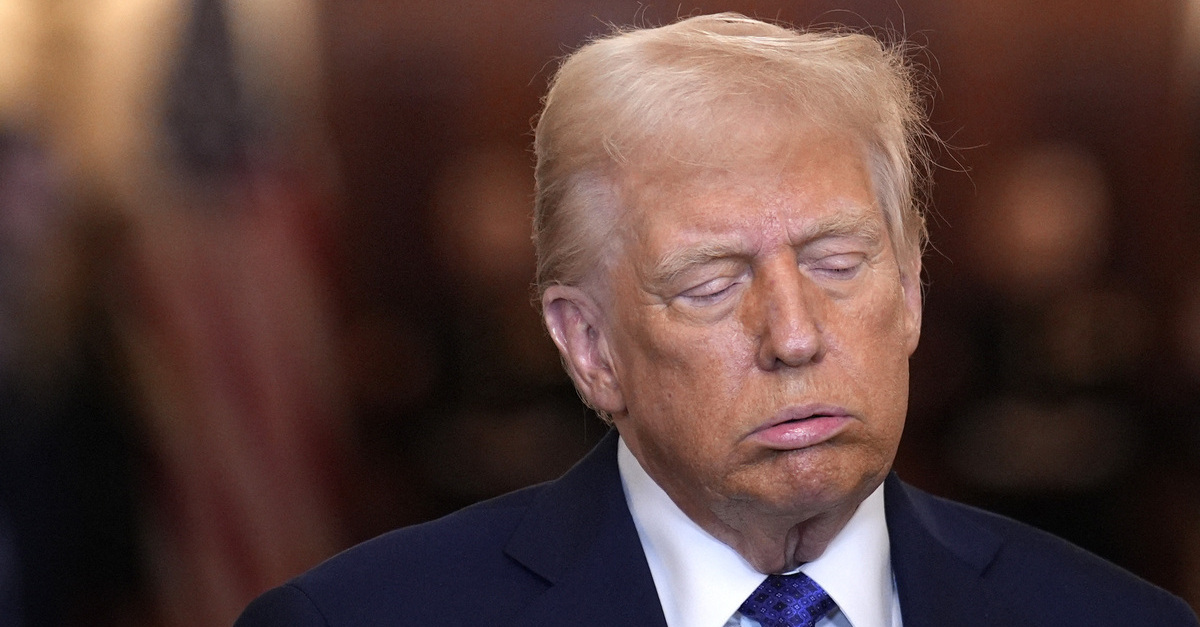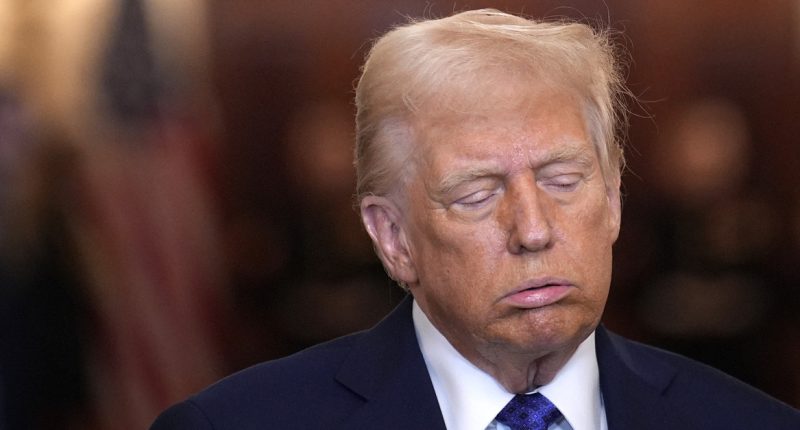
US President Donald Trump arrives before signing the Laken Riley Act into law in the East Room at the White House in Washington on January 29, 2025. The law, named after a Georgia student murdered by an undocumented immigrant is the first bill of the second Trump administration (Yuri Gripas/Abaca/Sipa USA/Sipa via AP Images).
A federal judge has blocked the Trump administration from enforcing executive orders that aim to curtail transgender medical care.
On Friday afternoon, Joe Biden-appointed U.S. District Judge Lauren King, sitting in Seattle, issued a preliminary injunction in favor of four states and three doctors who sued the government earlier this month. Washington, Minnesota, and Oregon were the initial state plaintiffs; Colorado joined the litigation after the original petition was filed.
The injunction does not have nationwide reach, however, and applies in those four states alone – which is in line with the plaintiffs’ requests.
Under the terms of Executive Order 14187, entitled “Protecting Children from Chemical and Surgical Mutilation,” the 45th and 47th president intends to cut off all federal funding for institutions that offer pediatric gender transition services or provide any kind of gender-affirming care for people under the age of 19. In Executive Order 14168, entitled “Defending Women From Gender Ideology Extremism and Restoring Biological Truth to the Federal Government,” Trump directed agencies to “end” federal funding of, and “ensure grant funds do not promote gender ideology.”
In a 53-page order, the court found most of the challenged provisions violate the separation of powers between the three branches of government.
“Instead of ‘tak[ing] Care that [such] Laws be faithfully executed,’ as is his duty under the Constitution, President Trump issued two Executive Orders directing revocation of the funding for any grant recipients that ‘promote gender ideology,’ including by providing medical care for gender dysphoria,” the court explains. “But the President ‘does not have unilateral authority to refuse to spend the funds’ Congress appropriates, nor can he ‘switch the Constitution on or off at will’ to advance his policy preferences.”
The judge also said the anti-transgender executive orders, in large part, violate the Fifth Amendment’s guarantee of equal protection under the laws.
“The Fifth Amendment’s equal protection guarantee prohibits the federal government from treating people differently based on sex or transgender status unless the government can establish an ‘exceedingly persuasive justification’ for doing so and a ‘close means-end fit,” the order goes on. “The government cannot do so here.”
Both of the executive orders “facially discriminate on the basis of transgender status and sex,” the court found. This analysis is brief and based on the text of each order, which specifically single out and condition funding on whether institutions serve transgender individuals, provide gender-affirming care, or “promote gender ideology.”
King goes on to note that the first executive order “is not limited to children, or to irreversible treatments, nor does it target any similar medical interventions performed on cisgender youth,” and therefore is impermissibly broad.
The court spends considerable time ridiculing the notion that one of the executive orders purports to infringe on the rights of adults and medical providers who serve adults.
From the court order, at length:
Despite professing to protect “impressionable children” from the decisions of “adults,” the Medical Services EO bans federally funded institutions from providing the Listed Services to 18- year-old adults. Defendants argue that the Order is not rendered overbroad by its inclusion of 18-year-olds because “the relevant risks apply to adolescents.” Tellingly, the only authority they could locate for this proposition is from Canada, where the age of majority is 19 in four provinces and three territories. But Defendants do not dispute that in all Plaintiff States as well as the vast majority of other U.S. states, 18-year-olds are legally recognized as adults who are generally entitled to make their own medical decisions. The Medical Services EO is wholly devoid of any explanation as to why, in spite of relevant state laws, 18-year-olds should nonetheless be considered “impressionable children” at risk of irreversible harm due to decisions made by “adults.”
More Law&Crime coverage: ‘Unprecedented assertion of presidential power’: Trump order aims to ‘extinguish the independence’ of regulatory agencies and ‘dictate’ outcomes, new lawsuit says
The judge says the medical services executive order is poorly written in other ways – namely in how it would generally apply to both transgender and cisgender individuals well beyond gender-affirming care.
In the order, the Trump administration purports to prohibit any “individual who does not identify as his or her sex” from obtaining “puberty blockers.” As it turns out, sometimes puberty blockers are used in cancer treatments, the judge notes. So, the upshot of the executive order is that a transgender individual would be barred from receiving necessary cancer treatment.
In similar fashion, the Trump administration also purports to prohibit surgical procedures “that attempt to alter or remove an individual’s sexual organs to minimize or destroy their natural biological functions,” according to the order. This language would broadly prohibit an 18-year-old from obtaining a vasectomy.
The government, for their part, attempted to redefine some of the language in the order in a motion opposing the injunction – but the judge was not convinced. She said such efforts by the government do “not change [the executive order’s] definitional sweep, just as the Order’s definition of ‘child’ to include 18-year-olds is not altered by the fact that 18-year-olds are not children.”
Next, the judge says the claimed interest by the government is unconvincing. Here, the government’s stated goal is preventing youths from experiencing “regret” that might come later in life from receiving gender-affirming care.
The court doubts, in the first place, whether that is even a legitimate governmental interest – but accepts the idea for the sake of argument. Even then, the court determined, the plaintiffs come out on top of the ensuing debate.
“The Executive Order implicitly recognizes that not all youth who receive gender-affirming care regret it, and it is undisputed that there are serious and sometimes irreversible risks to transgender youth either way,” the order reads. “However, the Medical Services EO takes into account only the risks associated with regret, making no attempt to balance them against the very real risks (supported by ample medical data) facing transgender youth who desire gender-affirming care but do not receive it.”
And, in that debate, the evidence is not a close call.
“Nor does the Order weigh the risks of gender-affirming care against the potential benefits,” the court order continues. “Instead, it simply dismisses the Standards of Care as ‘junk science’ and conclusory pronounces that they ‘lack scientific integrity.’ But almost every court and medical organization to address the issue has disagreed with that view.”
Moreover, the court notes, there is no corresponding attempt by the Trump administration to ban gender-affirming care for cisgender individuals.
Love true crime? Sign up for our newsletter, The Law&Crime Docket, to get the latest real-life crime stories delivered right to your inbox.
The court also thoroughly rejects the second executive order as little more than a “bare desire to harm a politically unpopular group.”
“Defendants were hard-pressed to justify such baldfaced stigmatization,” the court observes. “And they failed to do so, instead focusing their briefing on this point entirely on the ‘serious harms to young people’ that purportedly animate the Medical Services EO. Their sole attempt to explicate the Gender Ideology EO’s government interest—that it is ‘based on concerns about the harms stemming from [e]fforts to eradicate the biological reality of sex’—is conclusory and unsupported. Where, as here, government action is motivated by purposeful discrimination, it violates the Fifth Amendment’s equal protection guarantee.”
Friday’s order is not the first time King has weighed in against the Trump administration’s anti-transgender crusade. On Valentine’s Day, the judge issued a temporary restraining order against the policies at issue. Her latest order will now last until the case concludes at the district court level or unless the governments seeks and is granted a stay pending appeal.







